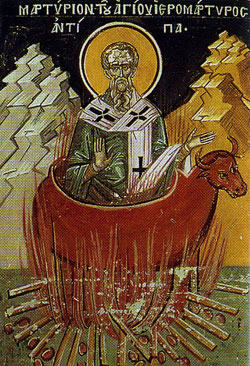
Feastday: April 11
Patron: against toothache
Death: 90
Martyr and disciple of St. John the Apostle who called Antipas "my faithful witness." Tradition states that Antipas was the bishop of Pergamum, but this is not documented. He is believed to have been burned to death. The only mention of him is in Revelation.
For other uses, see Antipas (disambiguation).According to Eastern Orthodox traditions, according to the Commentary on the Apocalypse of Andreas of Caesarea, believe Saint Antipas to be the Antipas referred to in the Book of Revelation, Revelation 2:13, as the verse says: "I know thy works, and where thou dwellest, even where Satan's seat is: and thou holdest fast my name, and hast not denied my faith, even in those days wherein Antipas was my faithful martyr, who was slain among you, where Satan dwelleth." According to Christian tradition, John the Apostle ordained Antipas as bishop of Pergamon during the reign of the Roman emperor Nero. The traditional account goes on to say Antipas was martyred during the reign of Nero (54-68), by burning in a brazen bull-shaped altar for casting out demons worshiped by the local population.
There is a tradition of oil ("manna of the saints") being secreted from the relics of Saint Antipas.
Saint Antipas is invoked for relief from toothache, and diseases of the teeth. On the calendars of Eastern Christianity, the feast day of Antipas is April 11.





